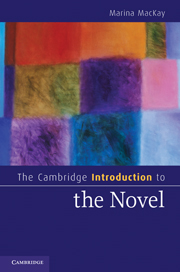Book contents
- Frontmatter
- Contents
- Acknowledgments
- About this book
- Chapter 1 Why the novel matters
- Miguel de Cervantes, Don Quixote (1605, 1615)
- Chapter 2 Origins of the novel
- Laurence Sterne, The Life and Opinions of Tristram Shandy, Gentleman (1759–67)
- Chapter 3 Narrating the novel
- James Hogg, The Private Memoirs and Confessions of a Justified Sinner (1824)
- Chapter 4 Character and the novel
- Nathaniel Hawthorne, The Scarlet Letter (1850)
- Chapter 5 Plotting the novel
- Gustave Flaubert, Madame Bovary (1857)
- Chapter 6 Setting the novel
- Charles Dickens, Bleak House (1853)
- Chapter 7 Time and history
- Virginia Woolf, To the Lighthouse (1927)
- Chapter 8 Genre and subgenre
- Graham Greene, The Ministry of Fear (1943)
- Chapter 9 Novel and anti-novel
- Thomas Pynchon, The Crying of Lot 49 (1966)
- Chapter 10 Novel, nation, community
- Salman Rushdie, Midnight's Children (1981)
- Chapter 11 Concluding
- Notes
- Glossary
- Further reading
- Index
- Cambridge Cultural Social Studies
- References
Further reading
Published online by Cambridge University Press: 05 June 2012
- Frontmatter
- Contents
- Acknowledgments
- About this book
- Chapter 1 Why the novel matters
- Miguel de Cervantes, Don Quixote (1605, 1615)
- Chapter 2 Origins of the novel
- Laurence Sterne, The Life and Opinions of Tristram Shandy, Gentleman (1759–67)
- Chapter 3 Narrating the novel
- James Hogg, The Private Memoirs and Confessions of a Justified Sinner (1824)
- Chapter 4 Character and the novel
- Nathaniel Hawthorne, The Scarlet Letter (1850)
- Chapter 5 Plotting the novel
- Gustave Flaubert, Madame Bovary (1857)
- Chapter 6 Setting the novel
- Charles Dickens, Bleak House (1853)
- Chapter 7 Time and history
- Virginia Woolf, To the Lighthouse (1927)
- Chapter 8 Genre and subgenre
- Graham Greene, The Ministry of Fear (1943)
- Chapter 9 Novel and anti-novel
- Thomas Pynchon, The Crying of Lot 49 (1966)
- Chapter 10 Novel, nation, community
- Salman Rushdie, Midnight's Children (1981)
- Chapter 11 Concluding
- Notes
- Glossary
- Further reading
- Index
- Cambridge Cultural Social Studies
- References
- Type
- Chapter
- Information
- The Cambridge Introduction to the Novel , pp. 206 - 210Publisher: Cambridge University PressPrint publication year: 2010

